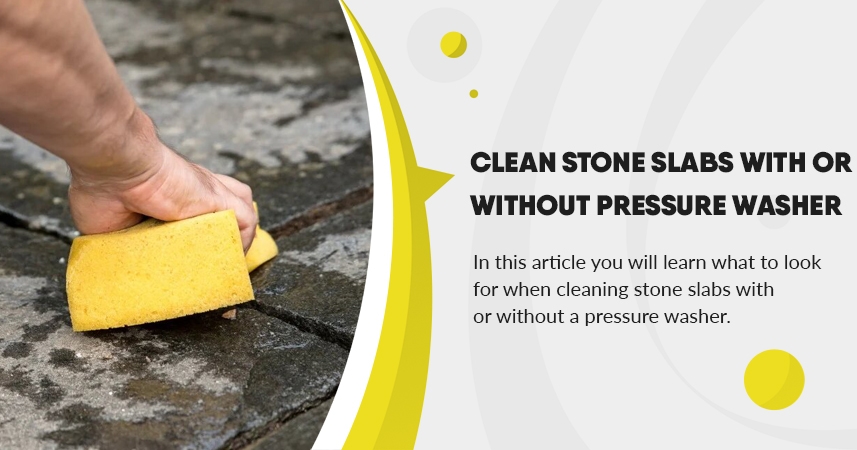


While some stone slabs can be cleaned with a pressure washer, you should avoid this device for natural stone. You can find all info on the subject here.
What are the options?
Cleaning stone slabs without a pressure washer
Although cleaning stone slabs with a pressure washer may be faster, there are also many good arguments against it – and in favor of using a scrubber and pure muscle power instead. Some slabs are also not suitable for a hard water jet, which includes virtually all natural stone slabs. The porous surface structure of sandstone, quartzite and co. can be permanently damaged by the device.
Those who opt for manual cleaning also save on electricity costs and do not generate noise pollution from the motor noise. There is also no need for the sometimes high purchase or rental costs of the device. In addition, the joint filling compounds are spared. For easier cleaning, you can, for example, attach a water hose to a broom with cable ties.
Video:
Cleaning stone slabs with a pressure washer
However, cleaning with a pressure washer is much faster and spares your muscles. Appropriate equipment does not always have to be purchased, but can also be rented by the hour at the hardware store or specialty store. In particular, larger areas made of robust coverings (such as concrete pavers or concrete blocks) tolerate this approach. This way you save water and shorten the cleaning interval.
However, be careful not to aim the water jet directly at the joints and turn your back towards the house wall. Otherwise, you run the risk of splashing water to stain the facade. Also, keep a close eye on cleaning agents that are recommended for use with high-pressure cleaners – acidic variants in particular should be avoided.
Video:
Product recommendations
Preparation
To ensure that your stone slabs are free of coarse dirt and troublesome weeds, you should start with preparation, For this, it is worth buying a joint scraper. This should have a hardened blade and a comfortable handle. With a special cleaner for oil and grease, affected areas can be optimally prepared for cleaning. Pay attention to the scope of packaging and suitability.
This joint scraper and modular. This allows it to be combined with handles and sticks in different lengths and designs – which is easy on your back when working in the garden. The blade is extra hardened and particularly sturdy. Dimensions given by the manufacturer are 30 x 2 x 8.5 cm.
This cleaner for oil and grease can be used to thoroughly pre-treat stains on your stone slabs. The product can be used on natural or artificial stone and removes oils and greases by absorbing them. After a short drying period, you can simply sweep off the cleaner. It is supplied in a container of 250 ml.
Cleaning stone slabs with a pressure washer
If you want to clean the stone slabs with a pressure washer, you will of course need an appropriate device. In addition to renting it from a hardware store or specialty retailer, it may also be worthwhile to purchase one, whereby you should pay attention to the area performance, the flow temperature and the pressure (in bar). The surface cleaner attachment should fit your type of stone and be compatible with the high-pressure cleaner.
Also of interest: What to look for when buying a pressure washer?
Sealing the stone slabs
Renewed soiling of the stone slabs can be delayed with a suitable sealant. When choosing a stone finish, make sure it is suitable for artificial or natural stone and any finishes – some products enhance the color or texture of the stone, for example. When filling the joints, keep an eye on the type of joint material and its specific properties.
Instructions: Cleaning stone slabs without a high-pressure cleaner in 3 steps
Preparation

Cleaning the joints. Start cleaning your flagstones at the joints to expose overgrowing stone material as well. It is worth using a joint scraper for this preparatory work. If there is overgrowth with also remove the roots – otherwise there is a risk that the unwanted plants will simply grow back.
If necessary, use patio cleaner: Oil stains, grease stains and other stubborn dirt should also be pre-treated. Special patio cleaners developed for this purpose are ideal for this purpose. Strictly adhere to the manufacturer’s instructions with regard to application and exposure time so as not to cause too much harm to the environment or possible damage to your stone slabs.
Cleaning stone slabs

Especially for stone slabs made of natural stone, you should refrain from using a high-pressure cleaner. The use of a direct jet of pressurized water could otherwise attack the surface of the stone. By the way, the same applies to acid-based cleaners – too aggressive a cleaner will quickly damage the porous and delicate stone surface.
Scrub with warm water. Instead, opt for a scrubber and a soft root brush and work the stone surface with lukewarm water. If needed, mix in some dishwashing liquid or a cleaning agent appropriate for the type of stone. Rinse the slabs with clean water afterwards. Sometimes it may be necessary to treat heavily soiled areas several times.
Remove stubborn lichens and moss. If moss or lichen still remains, you can try hot water. Boil water in a kettle and pour it directly onto the appropriate stone areas. Then remove the dirt with a root brush or scrubber.
Seal stone slabs

In a final step, you should still seal the stone slabs. This will not only protect them from renewed dirt and weathering, but can also highlight them visually. Using an impregnation can also create an effective abrasion protection. It is always important that the product used matches your stones.
Use stone enhancement. Apply the appropriate stone finish according to the manufacturer’s instructions and be sure to select ideal weather for it – it should not be raining or below 15°C temperature. Spread the impregnating agent evenly with a rubber scraper and do not walk on the surface for 24 to 48 hours.
Work in grit, sand or special jointing material. As a final step, the natural stone slabs should be regrouted. You have several options for this: Grout sand washes away in the rain, but it absorbs stresses from the stones. Grout can’t do that, but keeps weeds and moss well in check. Another alternative is split, which can drain moisture well.
Also of interest: Cleaning patio slabs
Possible problems & solutions
Potential preparation problems. In the course of preparation, you may encounter dirt and contaminants that cannot be removed with a scrubber alone. In that case, opt for special cleaning products that specifically remove oil, grease or lichen, for example. Before buying, check whether the relevant mixtures are suitable for your particular type of stone.
Possible cleaning problems. If you decide to clean with a pressure washer, you should pay attention to your alignment when using it. Otherwise, the problem of splashing water on surrounding surfaces (such as the wall of your house) will quickly arise. Also, keep a sufficient distance between the attachment and the floor, so as not to damage the surface of the stones.
Possible problems with the cleaning agent. Cleaning agents are not only problematic for some stone slabs in terms of ingredients, but they can also harm the environment. Therefore, before using chemical agents, weigh whether the application is really necessary. In addition, strictly adhere to the manufacturer’s instructions for any use.
Also of interest: Cleaning and maintaining a wooden terrace
FAQ
What is the best way to clean natural stone slabs?
Natural stones are rather sensitive, which is why you should definitely avoid using a high-pressure cleaner on these slabs. Instead, use a pH-neutral special cleaner, cold or lukewarm water, and a soft root brush for cleaning.
Why shouldn’t vinegar be used to clean stone slabs?
Just like chemical cleaners and other home remedies (think salt, for example), vinegar should not be used outdoors. Otherwise, on sealed stone slabs, this agent can quickly get into the groundwater, which could have negative consequences for the environment. Additionally, natural stone slabs cannot tolerate the acid it contains.
What are the techniques for cleaning stone slabs?
You can clean stone slabs either with a scrubber “by hand” or with a high-pressure cleaner. While the first option consumes more water and takes longer, the second option is suitable only to a limited extent for natural stone types and is more expensive due to the purchase of equipment or a corresponding rental.
How to properly clean stone slabs without a pressure washer?
First clean the joints and treat heavy soiling with special cleaners before working on the stone slabs with water and a scrubbing brush. Heavy green buildup can be removed with hot water. After that, seal the surface and fill the joints if necessary.


